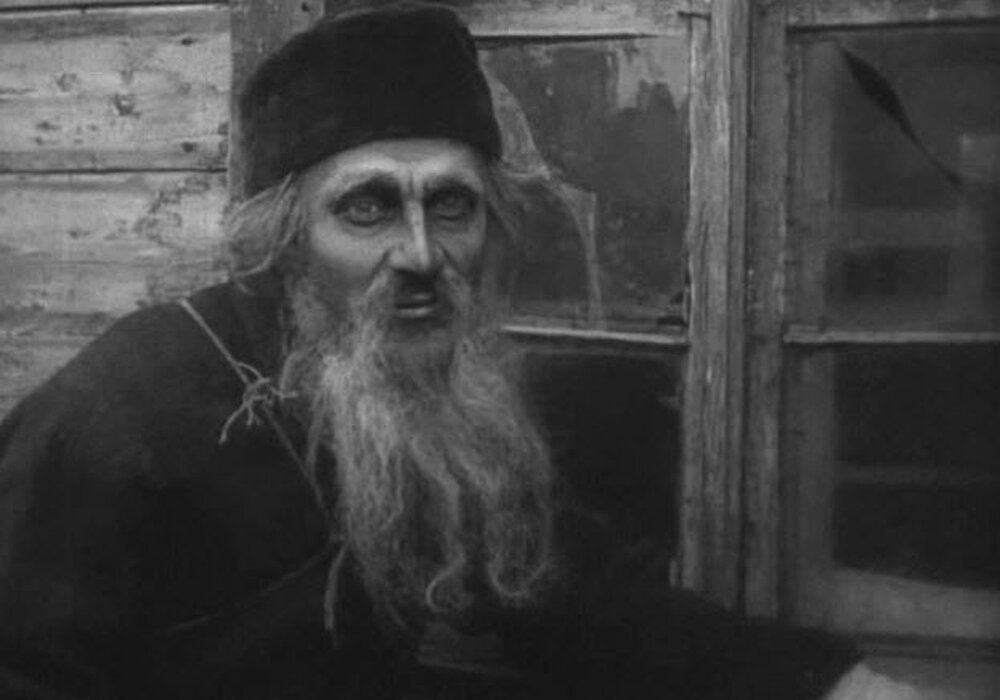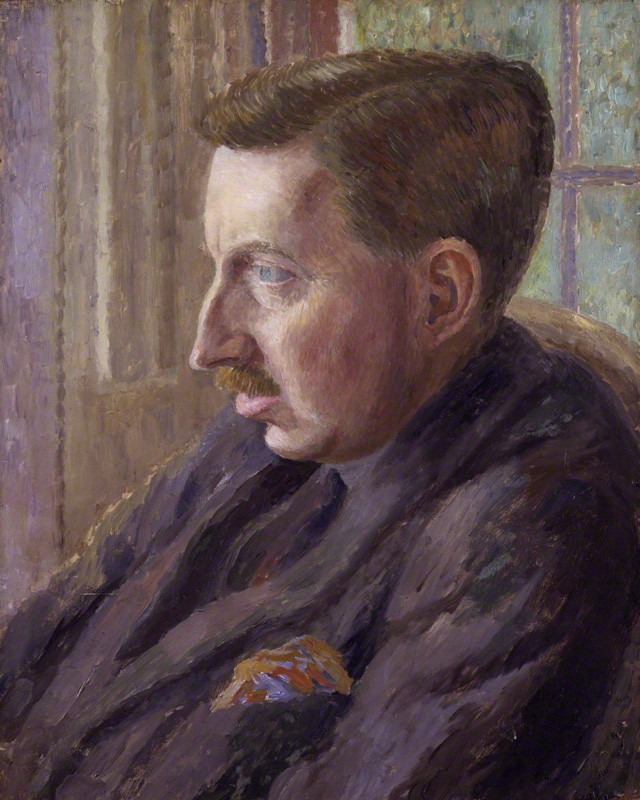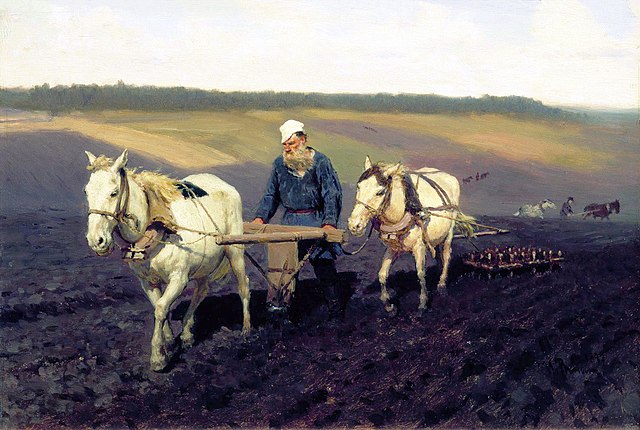Although I’ve been having a go at Tolstoy lately, I still admire him, and would probably rank his writings above those of anyone else. Unfortunately, Tolstoy’s novella, “Father Sergius”, is another one of those frustrating prophet-Tolstoy pieces, so today’s post will be stained once again with disappointment. It shouldn’t be, in a way. Father Sergius, like Hadji Murat, was not published while Tolstoy was alive. Tolstoy shied away from publishing both works because they revealed too much about himself – at least, I remember reading that view somewhere among the criticism on Hadji. But whereas Hadji Murat revealed that Tolstoy still knew how to write cracking fiction even after he was old, “Father Sergius” reveals that Tolstoy was an awful egotist who thought he was better than everyone else. Because that’s basically what the novella is about: Tolstoy, Tolstoy, Tolstoy.

I recently read George Orwell’s essay on Tolstoy, “Lear, Tolstoy and the Fool”. To my knowledge, Orwell hadn’t come across “Father Sergius”, but the two pieces go together quite well. Orwell argues that the lives of Tolstoy and King Lear are curiously similar. Both were men who, in their old age, renounced their power, but then became bitter and angry for it. Both Lear and Tolstoy practiced self-denial – something normally associated with saintliness and goodness – for selfish reasons. In renouncing their earthly power, both men aimed to gain spiritual power and with it a greater sway over hearts and minds. Tolstoy gave up his copyrights, he neglected his fiction, but he did not give up the idea that he ought to influence people. Quite the opposite, as the torrent of moralistic pamphlets he produced evidences.
In short, Tolstoy’s renunciation was incomplete. Or, as Orwell puts it, “if you live for others, you must live for others, and not as a roundabout way of getting an advantage for yourself.”
What does all this have to do with “Father Sergius”? Quite a lot, actually. Tolstoy’s novella is essentially a dramatization of this conflict. Our hero, Father Sergius, becomes a famous monk, but he remains unsatisfied with his life. Though he is supposedly serving God, he finds that in reality he is serving other people – the people who come to his refuge, the other members of his monastery. And of course, he is also serving his own pride. But, as with Hadji Murat, “Father Sergius” is also the story of how its central character reaches enlightenment of a Tolstoian sort. What happens?
A Bad Breakup – The Opening of “Father Sergius”
D’ya ever have that thing where you go off and become a monk just because your girlfriend turned out to have had a previous partner? Nobody? Tolstoy, with his many children with peasant girls, of course knew a thing or two about previous partners. But after his religious conversion he became very anti-sex, which we can see most clearly in The Kreutzer Sonata, but which is also on display in “Father Sergius”. Our hero is Prince Stepan Kasatsky, a young man at the story’s beginning, but one who has already risen almost to the peak of society. Apart from his one weakness, sudden bursts of rage (amazingly, Tolstoy suffered from this also), he’s a model man. He is the best at everything he tries, and has rather gotten used to that feeling of superiority. True, he’s not admitted to the very highest reaches of society, but otherwise he can’t complain.
He has a good role in the military, and has made an excellent match to a young lady. But here is where his problems start. What he doesn’t know is that this girl has been the lover of Nicholas I. In the second chapter we’re taken into her garden, a little while before the wedding. Everything seems perfect – even the nightingales are a-twitter. But “Mary” (a foreignized name in Russian literature almost always means something’s wrong) is in a state. She needs to admit to her past before the marriage, but it’s hard. Eventually manages to work up the courage, but Kasatsky is not willing to give her a hearing at all. (I’m pretty sure if the Emperor of all the Russians wanted to bed you, you didn’t have much choice in the matter). He gets up, gets angry, sells his estate, leaves his job, and becomes a monk.
As you do, of course.
Monk Days
Why does he become a monk? There are two reasons, we’re told. The first is that it lets him “stand above those, who thought they could look down on him”. The second is a real religious feeling, which is mixed up with pride and a desire to be the best. Anyway, Kasatsky becomes Father Sergius, but his problems do not end there. One day, while helping at a service, he is recognised by some ladies, who point him out to each other in French. Then, after the service his superior calls him round back to chat with a general who used to know him. Father Sergius is angry at the fact that even being a monk doesn’t save him from the people he was trying to escape. What is worse, the monks themselves aren’t as good as they’re supposed to be. There’s only one thing for it – to become a hermit!

A Hermit and his Temptation
Father Sergius gets permission to go to another monastery, further from civilization, and there he occupies the quarters of a recently deceased hermit. All seems well, and a few years pass. But one night a group of revellers is passing by, and one of their company, Makovkina, a young lady, decides to go and see Father Sergius, whose old identity they are all familiar with. Makovkina comes up with a plan to seduce him. (As you do). Anyway, she makes her way to his rooms and asks for shelter, saying she’s lost. At first, Father Sergius can’t believe she’s real – he thinks she’s an apparition, or else the devil. (“For the devil always appears as a woman”). But eventually, he lets her in.
Father Sergius has been a hermit all this time but he is still weak to “lust”. This woman causes a resurgence of his old feelings. Her power is that she is a normal human being. Her laughter, “cheerful, natural, kind,” has an effect on him. But normal human beings are evil people, Tolstoy would have us know, and this woman is a temptress! There is a great moment here, when the woman is drying herself and getting warm (Father Sergius refuses to see her more than he needs to), and we only hear her, just as Sergius does. It’s nice to remember that Tolstoy does know how to write.
Anyway, Father Sergius knows he has to see her, but he’s scared he will be unable to defeat his lust. So what is the logical solution? He cuts off his finger with an axe. Of course, when you have cut off your finger you end up a little distracted, with the result that temptresses can’t bother you. He goes in to see her, with his hand bleeding, like some axe murderer from a horror movie, and says: “dear sister, why did you want to destroy your eternal soul?” Amazingly, instead of being terrified, she leaves the hovel, changes her life, and becomes a nun. Cool, huh?
A Healer in Need of Healing
Time passes. Father Sergius acquires a reputation as a healer. And his isolation is brought to an end. Instead of living on simple food, his monastery now ensures he eats properly and is kept healthy. He has a constant stream of visitors, but in all of this he feels a growing dissatisfaction. He is being driven away from God and among the people:
“He had become like a place where once there had been a stream. “There was once a weak trickle of living water, which quietly flowed from me, and through me. That was the true life… but now I have had no time to gather water, for the thirsty are always coming, closing in and pushing at each other. They have crushed everything – now there is only dirt left.””
Father Sergius doesn’t like the people he meets, and it’s not clear that he can actually heal them either. They come to him “with their selfish demands”, and he gives them what they want. One day a merchant comes to him, wanting him to heal his daughter. He agrees. But when she comes, alone, she seduces Father Sergius instead. The next day, acting on plans he had made long ago, Sergius flees the monastery.
Flight
Tolstoy also fled a life that didn’t satisfy him. He died at the railway station at Astapovo, that being as far as he could get from his family before his body failed. “Father Sergius” was written over ten years before Tolstoy’s death, but the idea of fleeing was not a new one for him, just as the suicide Sergius also considers wasn’t either. Sergius goes to an old acquaintance, Pashenka, who he had treated unkindly as a child. He discovers her living poorly, surrounded by family, and struggling to survive. But the meeting brings an epiphany to him. “I lived for people under the pretext of serving God, while Pashenka lives for God, imagining that she’s living for people.” This final revelation allows him to live freely as an unknown wanderer, before eventually he is stopped by police and sent to Siberia for not having identity documents.
And there he lives happily ever after.
Tolstoy and The Holy Life – Identity and Truth
There are some interesting bits and pieces in “Father Sergius”, but they are ideas more than the story itself. One of the main themes in the story is that of identity. “Father Sergius” as a title is not a reflection of Stepan Kasatasky’s ultimate identity, but only an intermediary stage in its development. When Kasatsky first becomes a monk people often refer to his past by using his pre-monastic name, such as the women in the church or else Makovkina. Later he becomes “Father Sergius” the healer. But he is not a holy person – the story’s title is in fact ironic: “He now had no love, no humbleness, not even any purity”, he thinks after becoming well-known.
When he eventually flees, he destroys all of those past ideas of himself and returns to his own childhood. Pashenka calls him “Stiva” (the familiar version of “Stepan”), marking a new stage in his development. Finally, once he is a beggar, he answers the question of his identity by saying he is simply “a servant of God”. At last, he has removed all those connections with his past that made him a selfish person, and he is “free” to enjoy himself.
In connection with the subject of identity, “Father Sergius” also contains a persistent critique of organised religion. This is perhaps unsurprising – Tolstoy was excommunicated by the Orthodox Church in 1901, a few years after he’d finished “Father Sergius”. In the story the other monks are just as concerned about power, fame, and wealth as everyone else. More importantly, though, they are not shown to be in touch with any real kind of faith, either. Father Sergius himself regularly prays, but there is no sense that his prayers are answered until he finally leaves the monastery after his night with the merchant’s daughter.
Conclusion
Overall, I’m not sure I’m glad I read “Father Sergius”. I had expected something like Hadji Murat or “The Death of Ivan Ilyich”, where Tolstoy manages to squeeze in a moral message into a brilliant story. “Father Sergius” is a moral with a story attached, and there’s plenty to dislike here. In particular I hate the misogyny underlying Tolstoy’s depiction of women, something which is even stronger than the general atmosphere of misanthropy that pervades the story. There’s so little positivity here. The moral that we should serve God/our hearts rather than other people is, I suppose, okay, but when it’s combined with such dislike for humanity it’s hard to take seriously.
It’s like Tolstoy forgot that God (in Christian cosmology) created the world and wanted us to enjoy it. The whole thing’s just stupid. Alas, just as Orwell suggested, once Tolstoy gained his new faith, he didn’t seem to realise that he often appeared a fool. He would have been a lot more convincing, both as a writer and as a moral writer, if he had a little more self-awareness.
Anyway, if you’re after Tolstoy, go read Hadji Murat, or Anna Karenina, or “The Death of Ivan Ilyich”, or War and Peace. And if you’ve read them already, read them again, and again, and again.


